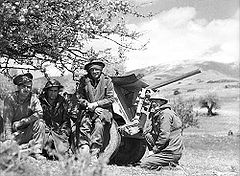Battle of Vevi (1941)
| Battle of Vevi | |||||||
|---|---|---|---|---|---|---|---|
| Part of World War II | |||||||
 Members of the Australian 2/1st Anti-Tank Regiment resting, soon after their withdrawal from the Vevi area. |
|||||||
|
|||||||
| Belligerents | |||||||
|
|
|
||||||
| Commanders and leaders | |||||||
|
|
|
||||||
| Strength | |||||||
| eight infantry battalions; elements of one machine gun battalion and several artillery batteries | one mechanised brigade (Waffen SS); one armoured brigade (German Army) | ||||||
| Casualties and losses | |||||||
|
British Commonwealth Dead: about 56 (28 Australians, about 27 British, 1–2 NZ ). Wounded: ? Taken prisoner: 480. Greece Dead/Wounded: at least 40. Taken prisoner: 136. |
Nazi Germany SS: 37 dead, 98 wounded, two taken prisoner Army: unknown. |
||||||
The Battle of Vevi (or Veve, Greek: Μάχη της Bεύης), in Greece, also known as the Battle of the Klidi Pass, was part of the Greek campaign of World War II. It took place on 11–12 April 1941, north of the town of Amyntaion, close to the northwestern Greek border. Allied troops fought forces from Nazi Germany.
German forces invaded Greece and southern Yugoslavia from Bulgaria in the first week of April 1941. Following the collapse of resistance in Yugoslavia, the left flank of the Vermion line held by Greek and British Commonwealth forces became exposed. A new plan intended that Commonwealth forces would hold off Germans forces in western Macedonia, until non-motorised Greek infantry units had withdrawn on foot from Mount Vermion to Mount Siniatsiko, and a new defensive line had been formed between Mount Olympus and the Aliakmon River.
On the morning of 10 April, the German XL Panzer Corps advanced from Monastir to seize the Greek city of Florina, 13 km (8.1 mi) south of the Yugoslav border, utilising the Monastir Valley (or "Monastir Gap"). Leibstandarte SS Adolf Hitler (LSSAH), a brigade group-level unit commanded by Oberstgruppenführer Josef "Sepp" Dietrich and accompanied by 9th Panzer Division, advanced further south and occupied the town of Vevi on 11 April. The German 73rd Infantry Division followed behind LSSAH and attacked to the west, to widen the front of the German breakthrough. Confronting the Greek Cavalry Division in an action at Pisoderi Pass, the 73rd failed to make any progress.
...
Wikipedia
